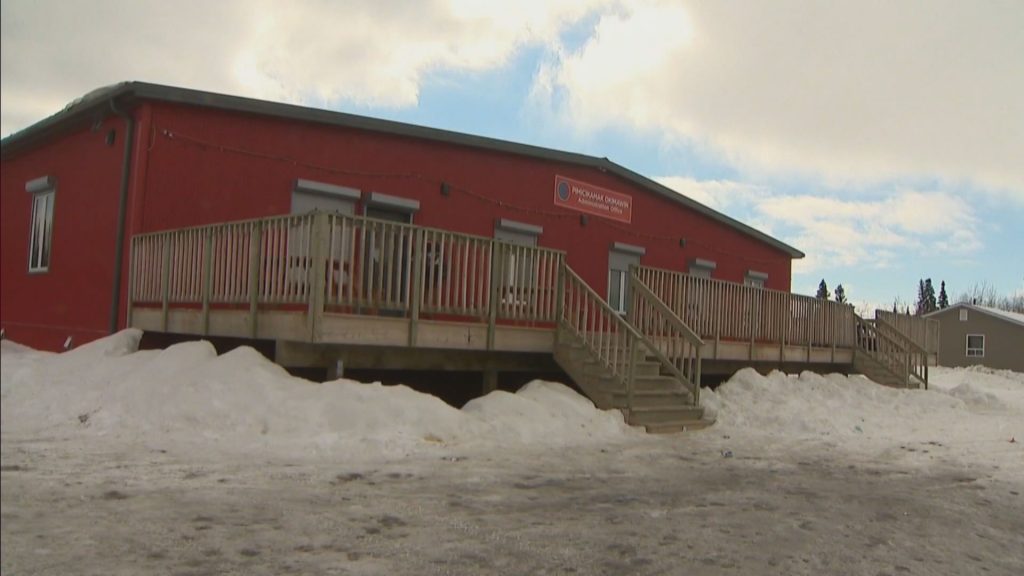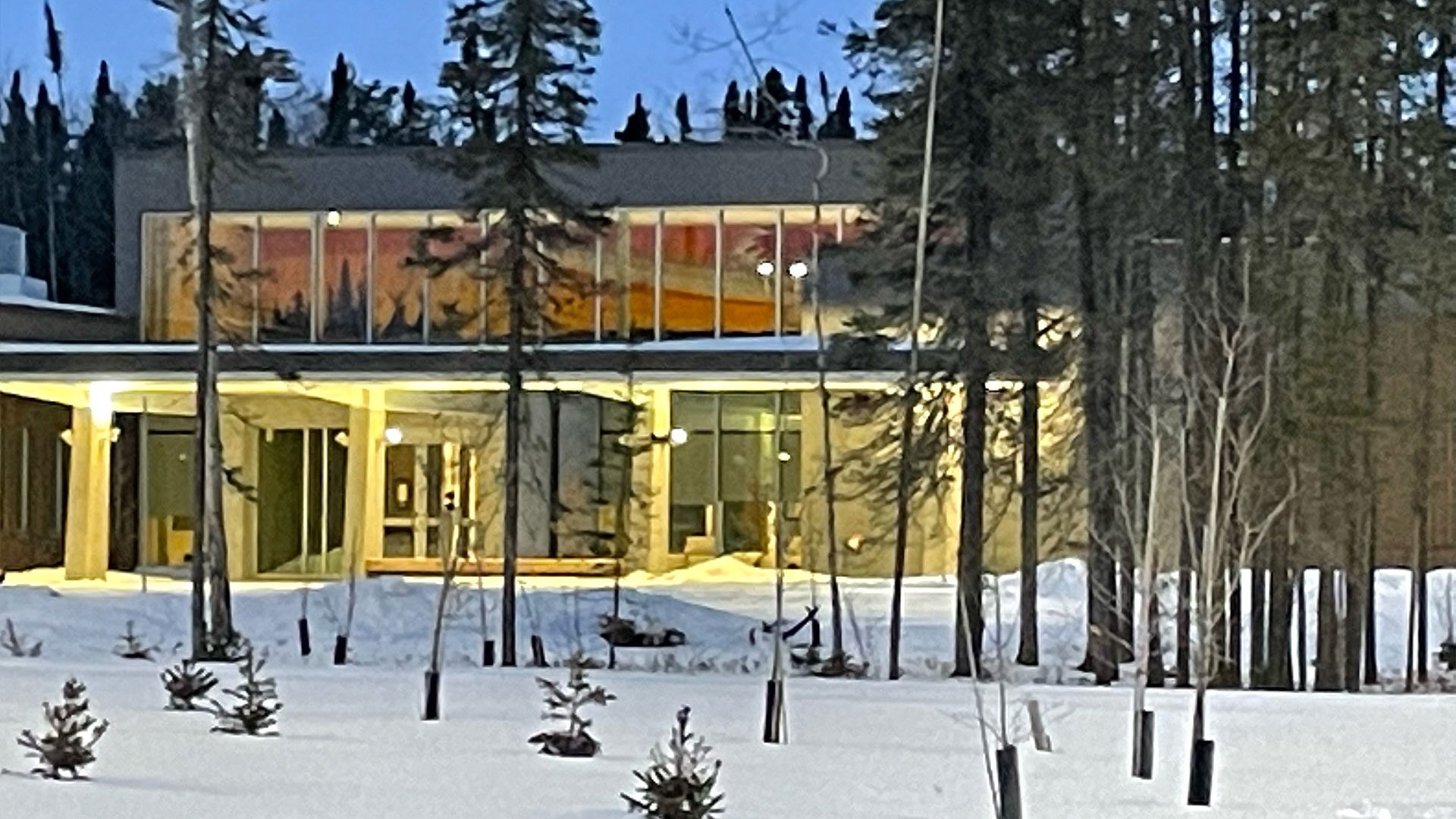
Cross Lake (PImicikamak Cree Nation) in northern Manitoba is in the midst of a health crisis due to a shortage of nurses. Photo: APTN file
A Cree Nation in northern Manitoba is the latest to be affected by a nursing shortage – something the federal and provincial governments say is a serious problem they’re working on.
“The nurses are getting burned out. They’re having a hard time with their work due to a lack of sleep,” said David Monias, chief of Cross Lake (Pimicikamâk), 520 km north of Winnipeg.
“And it’s creating a health crisis because we’re scared that something’s going to happen to one of our people.”
Monias said his band council declared a state of emergency on March 8 to restrict access to its health centre, which is also known as a nursing station.
“The patients are being turned away from the nursing station right now. We’re only open for emergencies,” he told reporters during a virtual news conference.
Four nurses
The chief said Cross Lake has four nurses to serve 8,000 people around the clock, when it should have 13.5.
He said it usually has six doctors, but they are no longer flying into the community “because they haven’t been able to complete the contract that they have with the First Nations Inuit Health Branch of Health Canada.
“So we’re also faced with that crisis, as well.”
On top of that, Monias said the community’s new “state of the art” health clinic is standing idle awaiting electrical work, equipment and medical staff.
“We need doctors, nurses, lab technicians and so forth…,” he said. “We are calling on the government step up and do something here. It’s not unique to Cross Lake.”

The federal government, which is responsible for health services on First Nations through Indigenous Services Canada (ISC), said it was aware of the emergency. It indicated that, as the chief said, Cross Lake was not alone.
“Critical nursing services at the 21 nursing facilities run by ISC in remote Indigenous communities in Manitoba have been impacted,” said spokesperson Anispiragas Piragasanathar in an email to APTN News.
“ISC sent a letter to Chiefs on March 7, 2024, on the impact of nursing shortages in certain communities and strategies to address these shortages and minimize disruptions in patient care at nursing facilities. ISC is having ongoing discussions with communities who are affected by nursing shortages in Manitoba and is using all its resources to identify immediate and viable solutions.”
Piragasanathar said solutions include redeploying resources from other ISC-run facilities and recruiting more nursing staff and other health care providers to work on a temporary and/or permanent basis.
He said the federal government is also offering “loan forgiveness” for education costs for doctors and nurses working in rural and remote communities.
Maintain services
The Manitoba government said it was “actively working” to maintain services for Cross Lake but did not elaborate how.
“The province is committed to a government-to-government approach across Manitoba to ensure everyone has access to quality health care, where and when they need it,” a spokesperson said in an email.
The president of the union representing ISC nurses could not be reached for comment Monday.
But Darlene Jackson, president of the Manitoba Nurses Union (MNU), said she was sympathetic to the situation in Cross Lake.
“These nurses don’t belong to MNU they belong to (Professional Institute of the Public Service of Canada) PIPSC, but (Cross Lake) is absolutely correct when they say nurses are needed.
“The nursing shortage in Manitoba is, I would say, is probably one of the worst in Canada.”

Jackson said the province has 12,000 nurses and needs nearly 3,000 to fill vacant positions in hospitals and care homes. She said recruiting nurses to under-served areas like First Nations is harder than attracting them to urban areas like cities.
“Some of these nursing stations are fly-in, some of them are (accessible by) ice roads; actually recruiting and retaining any nurses in rural and remote areas is extremely difficult,” she said.
“What concerns me is the fact there’s 10,000 residents in Cross Lake with minimal health care … especially in communities where it’s not easy access to get in your vehicle and drive up the road for half an hour and be at a hospital.”
Jackson said the Canadian Nurses Association warned politicians and health officials 25 years ago they would be facing a shortage now.
“(They) looked at the demographics, the age of nurses, and said, ‘If we don’t do something now by the year 2025 we are going to be in a critical nursing shortage.'”
Pandemic
The workload of the COVID-19 pandemic speeded up the departures, Jackson added.
“In 2023, we were where we should have been in 2025 – a critical nursing shortage. And a lot of the issues in COVID had a lot to do with it – excessively long hours, mandating workload,” she said.
“So nurses that could retire and probably would have worked a few more years left the system.”
Meanwhile, Piragasanathar said patients eligible for the Non-Insured Health Benefits (NIHB) Program can access medical transportation coverage, should they need to travel outside their communities to access health services.
He noted eligible benefits include “ground and water transportation, air travel, accommodations, meals, and in-city transportation when travel is required to access health care.”









